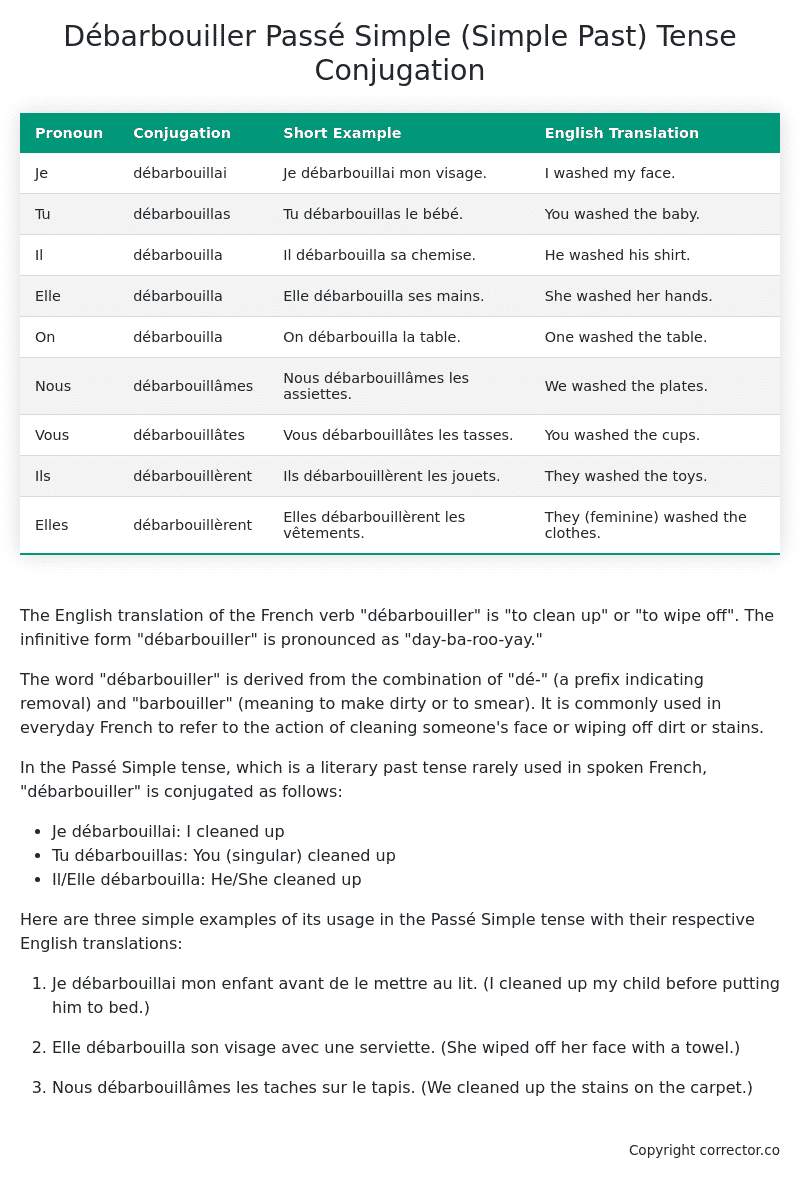Passé Simple (Simple Past) Tense Conjugation of the French Verb débarbouiller
Introduction to the verb débarbouiller
The English translation of the French verb “débarbouiller” is “to clean up” or “to wipe off”. The infinitive form “débarbouiller” is pronounced as “day-ba-roo-yay.”
The word “débarbouiller” is derived from the combination of “dé-” (a prefix indicating removal) and “barbouiller” (meaning to make dirty or to smear). It is commonly used in everyday French to refer to the action of cleaning someone’s face or wiping off dirt or stains.
In the Passé Simple tense, which is a literary past tense rarely used in spoken French, “débarbouiller” is conjugated as follows:
- Je débarbouillai: I cleaned up
- Tu débarbouillas: You (singular) cleaned up
- Il/Elle débarbouilla: He/She cleaned up
Here are three simple examples of its usage in the Passé Simple tense with their respective English translations:
-
Je débarbouillai mon enfant avant de le mettre au lit.
(I cleaned up my child before putting him to bed.) -
Elle débarbouilla son visage avec une serviette.
(She wiped off her face with a towel.) -
Nous débarbouillâmes les taches sur le tapis.
(We cleaned up the stains on the carpet.)
Table of the Passé Simple (Simple Past) Tense Conjugation of débarbouiller
| Pronoun | Conjugation | Short Example | English Translation |
|---|---|---|---|
| Je | débarbouillai | Je débarbouillai mon visage. | I washed my face. |
| Tu | débarbouillas | Tu débarbouillas le bébé. | You washed the baby. |
| Il | débarbouilla | Il débarbouilla sa chemise. | He washed his shirt. |
| Elle | débarbouilla | Elle débarbouilla ses mains. | She washed her hands. |
| On | débarbouilla | On débarbouilla la table. | One washed the table. |
| Nous | débarbouillâmes | Nous débarbouillâmes les assiettes. | We washed the plates. |
| Vous | débarbouillâtes | Vous débarbouillâtes les tasses. | You washed the cups. |
| Ils | débarbouillèrent | Ils débarbouillèrent les jouets. | They washed the toys. |
| Elles | débarbouillèrent | Elles débarbouillèrent les vêtements. | They (feminine) washed the clothes. |
Other Conjugations for Débarbouiller.
Le Present (Present Tense) Conjugation of the French Verb débarbouiller
Imparfait (Imperfect) Tense Conjugation of the French Verb débarbouiller
Passé Simple (Simple Past) Tense Conjugation of the French Verb débarbouiller (You’re reading it right now!)
Passé Composé (Present Perfect) Tense Conjugation of the French Verb débarbouiller
Futur Simple (Simple Future) Tense Conjugation of the French Verb débarbouiller
Futur Proche (Near Future) Tense Conjugation of the French Verb débarbouiller
Plus-que-parfait (Pluperfect) Tense Conjugation of the French Verb débarbouiller
Passé Antérieur (Past Anterior) Tense Conjugation of the French Verb débarbouiller
Futur Antérieur (Future Anterior) Tense Conjugation of the French Verb débarbouiller
Subjonctif Présent (Subjunctive Present) Tense Conjugation of the French Verb débarbouiller
Subjonctif Passé (Subjunctive Past) Tense Conjugation of the French Verb débarbouiller
Subjonctif Imparfait (Subjunctive Imperfect) Tense Conjugation of the French Verb débarbouiller
Conditionnel Présent (Conditional Present) Tense Conjugation of the French Verb débarbouiller
Conditionnel Passé (Conditional Past) Tense Conjugation of the French Verb débarbouiller
Conditionnel Passé II (Conditional Past II) Tense Conjugation of the French Verb débarbouiller
L’impératif Présent (Imperative Present) Tense Conjugation of the French Verb débarbouiller
L’impératif Passé (Imperative Past) Tense Conjugation of the French Verb débarbouiller
L’infinitif Présent (Infinitive Present) Tense Conjugation of the French Verb débarbouiller
L’infinitif Passé (Infinitive Past) Tense Conjugation of the French Verb débarbouiller
Le Participe Présent (Present Participle) Tense Conjugation of the French Verb débarbouiller
Le Participe Passé (Past Participle) Tense Conjugation of the French Verb débarbouiller
Struggling with French verbs or the language in general? Why not use our free French Grammar Checker – no registration required!
Get a FREE Download Study Sheet of this Conjugation 🔥
Simply right click the image below, click “save image” and get your free reference for the débarbouiller Passé Simple tense conjugation!

Débarbouiller – About the French Passé Simple (Simple Past) Tense
Formation
Usage
Narration
Historical Context
Interactions with other tenses
Passé Composé
Imparfait
Conditional and Subjunctive
Summary
I hope you enjoyed this article on the verb débarbouiller. Still in a learning mood? Check out another TOTALLY random French verb conjugation!


